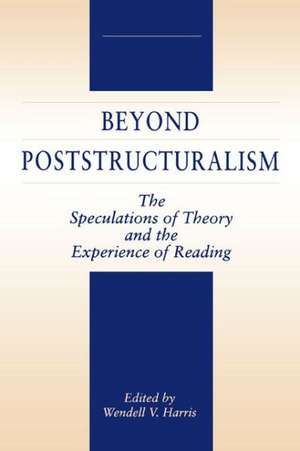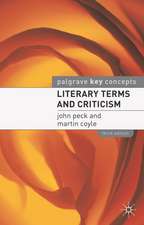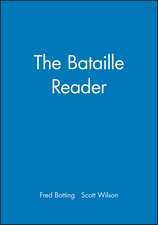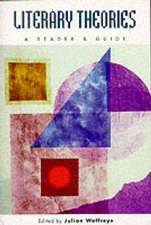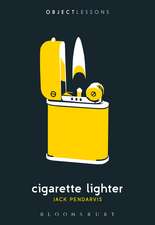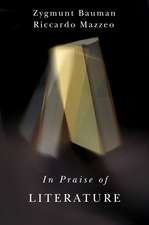Beyond Poststructuralism – The Speculations of Theory and the Experience of Reading
Autor Wendell Harrisen Limba Engleză Paperback – 14 sep 1996
The essays in Part II suggest ways to bring literary study into closer relation with human experience of the world. Their authors emphasize the role of literature in providing new perspectives and broadening the range of available alternatives to what is threatening, unjust, fallacious, or absurd in social and cultural structures.
Contributors are Bernard Bergonzi, John Holloway, Wendell V. Harris, A. D. Nuttall, Raymond Tallis, John Searle, Richard Levin, Robert Scholes, James Battersby, David Bromwich, Quentin Kraft, Michael Fischer, Charles Altieri, Christopher Clausen, Gayle Greene, Andre Lefevere, Daniel R. Schwarz, Virgil Nemoianu, and Martha Nussbaum."
Preț: 344.02 lei
Nou
Puncte Express: 516
Preț estimativ în valută:
65.83€ • 68.73$ • 54.36£
65.83€ • 68.73$ • 54.36£
Carte tipărită la comandă
Livrare economică 15-29 aprilie
Preluare comenzi: 021 569.72.76
Specificații
ISBN-13: 9780271025483
ISBN-10: 0271025484
Pagini: 460
Dimensiuni: 152 x 229 x 26 mm
Greutate: 0.69 kg
Editura: Penn State University
ISBN-10: 0271025484
Pagini: 460
Dimensiuni: 152 x 229 x 26 mm
Greutate: 0.69 kg
Editura: Penn State University
Textul de pe ultima copertă
The contributors to Beyond Poststructuralism critique the excesses of poststructuralist theory and suggest ways in which the study of literature can be improved. The essays in Part I seek to demonstrate fallacies of structuralist and poststructuralist thought that remain potent even though the theoretical structures that led to their enunciation have lost much of their original influence. These fallacies include the idea that one must avoid the consideration of authorial intention; that meanings are undecidable; that there is no justification for seeking unity in a text; that all hierarchies of value are reversible; that history is no more than an open contest among competing narrative constructions; and that the very nature of language makes the falsifiability of statements about human experience impossible. The essays in Part II suggest ways to bring literary study into closer relation with human experience of the world. Their authors emphasize the role of literature in providing new perspectives and broadening the range of available alternatives to what is threatening, unjust, fallacious, or absurd in social and cultural structures.
